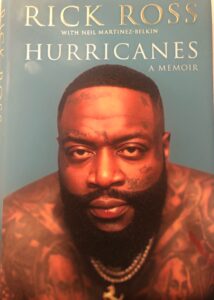
Miami-based rap artist Rick Ross released his memoir, “Hurricanes,” on Sept. 3, and fans have been thrilled. I certainly have been. William Leonard Roberts, also known as Rick Ross, has been one of my favorite rap artists since I was in high school, but up until a few years ago, he solidified himself as my No. 1.
His sophisticated lyrics — or big boy talk as he calls it — paints a visual for his fans to understand where he comes from and how he maneuvered into the position he’s in currently.
A few weeks ago I purchased his book by way of Amazon and a week later I dove straight into it. The first couple of chapters talked about his life before he entered the music industry and the struggles he faced while stepping on others’ toes to get into the music industry. It would be 10 years before Ross would catch his major break, eventually releasing classic rap albums.
In 2006, Ross released his first album , “Port of Miami,” that made everyone pay attention to him. After 10 years of ghost writing for other artists and being beyond the verge of giving up, he finally made it.
Before I read the book, there were always certain names I noticed that he consistently mentioned in his lyrics over 10 years. I knew they were drug related but I didn’t quite understand how they played a role in his life until reading the book.
Names such as Kenneth “Boobie” Williams, who was the leader of the “Boobie Boys Gang.” They were an established drug operation in Miami that was linked to 35 murders and responsible for $85 million worth of cocaine that was smuggled across Florida and 12 other states during the 1990s. Williams is now serving a life sentence in prison for his drug activity. Ross also included the names of Michael Delancy, Isaac Hicks and Black Bo, Ross’ friend for more than 15 years who recently passed away.
Ross wrote in the book and in his recently released album that losing Black Bo was the toughest loss he’s ever had to deal with. Ross found him dead in the bathtub in the home they shared. Doctors said he died of heart disease at 45 years of age.
“Hurricanes” describes how Ross grew up in Miami getting a street education from drug kingpins around the time when Miami was known for its heavy cocaine days. In that particular era, it was standard to say you looked up to people like Scarface and drug lords Ross was hanging around on a daily basis.
He talked about his children, parents and other relations he built or lost in the process of trying to get out of Miami’s drug world.
As Ross rose to stardom, his health declined from not getting proper sleep. He was on the road a lot, traveling, doing shows and touring. The life caught up with him and he had multiple seizures. He is now healthy and has lost more than 100 pounds.
Overall, the book was outstanding and it helped clear up any confusion I had while listening to his music. It was similar to watching an action movie and being on the edge of your seat the entire time, as I felt I was right beside him while reading “Hurricanes.” My level of respect for him and his music went up a few notches, even though it was already at the top.
“What if I drop this memoir and my biggest moments are still yet to come,” Ross writes. “God willing, that’ll be the case.”